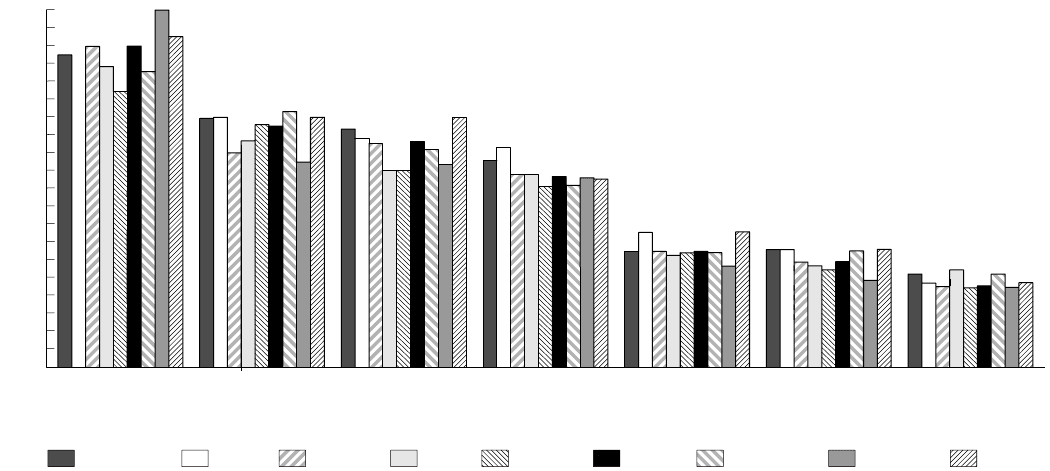Daunton M. The Cambridge Urban History of Britain, Volume 3: 1840-1950
Подождите немного. Документ загружается.


‘Although the co-op had a high rate of custom it had low “prestige” and was
least liked of all. Its customers were mainly working class and older people who
shopped there partly for financial reasons, partly from habit and partly from a
feeling of old loyalties.’
132
This is itself evidence of the rise of the new kind of
consumer society, market-led and advertising-fuelled, and unconcerned with the
aesthetics and morality of production as ends in themselves, which Redfern had
feared and disliked; and this survey offered an early indication of the Co-op’s
failure to combat or come to terms with the new consumerism. Subsequent
developments have consigned advocates of Redfern’s and related alternative
modes of consumption to an increasingly visible (and urban-centred) role as
environmental and ‘fair trade’ campaigners, to local co-operative campaigns on
the LETS (Local Exchange Trading Systems) model, to back-street shops and a
minority alternative society; but at the time he wrote this outcome was not inev-
itable, and the hegemony of the commercial model of consumerism still has its
articulate opponents.
133
The history of this contest deserves to be chronicled
further.
John K.Walton
132
Harris, Buyer’s Market, p. .
133
P. Lang, Lets Work: Rebuilding the Local Economy (Bristol, ).
Cambridge Histories Online © Cambridge University Press, 2008

·
·
Playing and praying
.
I
the Baptist Charles Haddon Spurgeon (–) took a preaching
career of star quality to a wider stage at the Surrey Gardens Music Hall. He
was the most famous of a number of nineteenth-century ministers of relig-
ion who were renowned for their almost theatrical style. Another who sought
dramatic means to further the cause of God was William Booth, the Salvationist,
for ‘why should the devil have all the best tunes?’ Together they illustrate one of
the ways in which, in the nineteenth century, religion increasingly appeared to
flatter the realm of leisure by imitation. In earlier centuries leisure activities had
more often appeared to grow out of the religious sphere. However, in the nine-
teenth century conflict and competition were more important themes than
cooperation, and the estrangement of leisure and religion was symbolised,
above all, by the temperance movement and Sabbatarianism. Similarities and
differences between the religious and the recreational are numerous, hence –
from Birmingham in – the observation that Good Friday ‘was spent by
the minority in the solemnities of ecclesiastical observance, but by the majority
as an opportunity of pleasurable open-air enjoyment’. In fact, much church-
going could be defined from a utilitarian point of view as having the essential
social qualities of other leisure-time pursuits, namely their voluntary, non-
remunerative, pleasure-seeking nature. Of course, spiritual edification was the
formal aim of churchgoing, but in the later nineteenth century leisure became
an aid to religious mission. By the mid-twentieth century, though, a diminish-
ing minority attended church regularly, and leisure was often a substitute for
religion. In a world of alienated labour, both manual and clerical, the ‘machin-
ery of amusement’seemed to fill the void, even to supply a motive for existence:
Londoners told a s sociologist, ‘without pleasure the worker may as well be
dead’. Cinema and sport, and the public house, fulfilled key functions of relig-
ion by offering sources of social identification and forms of consolation to the
Cambridge Histories Online © Cambridge University Press, 2008

denizens of great cities. We should note, however, that a diffuse, unaffiliated, rel-
igiosity remained widespread.
1
By the s the urban experience was the majority social experience, and
increasingly the typical experience, but there remained immense differences in
urban types. Was there a common element – an urban variable – which explains
much of the history of leisure and religion in the variety of towns and cities,
and, indeed, which differentiates their experience from that of the countryside?
How much was unique to the towns, and how much was there continuity
between them? These questions, and others about the nature of religion and
leisure in the urban experience, are explored below, commencing with an anal-
ysis which embodies an important distinction, namely that between the growth
of leisure time and leisure activities, and links both to the key question of
money.
(i)
That very large numbers of the employed population increasingly enjoyed
approved leisure was one of the many important innovations of the Victorian
period, and the overall increase in their leisure time underlay key leisure inno-
vations like railway excursions and Association football. However, if the essence
of leisure is time free from obligation (principally, but not only, the obligation
to work), ability to participate in most recreations also required financial
resources; thus those who were excluded from the labour market because of
unemployment or family responsibilities were severely restricted in their leisure.
The unemployed had superabundant time, but, in the absence of cash, this was
more often a curse than a blessing, especially in interwar Britain when both
leisure and unemployment boomed. Similarly, even though there was an overall
rise in living standards, the wide spectrum of wages among the employed,
together with the effects of individuals’ life cycles, had important implications
for access both to free time and to commercialised leisure. A St Helens black-
Douglas A. Reid
1
W. Owen Chadwick, The Victorian Church (London, –), vol. , pp. –; K. S. Inglis,
Churches and the Working Classes in Victorian England (London, ), pp. , –, cf. Oxford
Dictionary of Quotations, revised th edn (Oxford, ); H. McLeod, Class and Religion in the Late
Victorian City (London, ), p. n. ; Robert Currie, Methodism Divided: A Study in the
Sociology of Ecumenicalism (London, ), pp. –; Brian Harrison, ‘Religion and recreation in
nineteenth-century England’, P&P, (), –; J. H. S. Kent, ‘The role of religion in the
cultural superstructure of the later Victorian city’, TRHS, th series, (), ‒; Hugh
McLeod, ‘New perspectives on Victorian working-class religion: the oral evidence’, Oral History,
(), –; Birmingham Daily Post, Apr. ; William Pickering, ‘Religion – a leisure-
time pursuit?’, in David Martin, ed., A Sociological Yearbook of Religion in Britain (London, ),
pp. –ff; Henry Durant, The Problem of Leisure (London, ), pp. –; Ferdynand Zweig,
Labour, Life and Poverty (London, ), p. ; cf. R. McKibbin, The Ideologies of Class (Oxford,
), p. .
Cambridge Histories Online © Cambridge University Press, 2008

smith, a father of eight, ‘never had a holiday in his life’, recalled his widow. Even
after the trend to smaller families had set in a Mass-Observation survey of
London housewives found that they worked an average of fifteen hours a day.
Moreover, housewives’ spending money came from the household budget,
unlike the pocket money husbands took directly from their pay. And women still
carried the main domestic burdens even when doing paid work: ‘A working man
is a man of leisure compared with his working wife’, noted Ferdynand Zweig.
2
Nevertheless, when all necessary qualifications are made there was an overall
growth of leisure which requires explanation.
In the early nineteenth century leisure was regarded as the mark of the gen-
tleman, and popular leisure as idleness, to be censured and discouraged, espe-
cially when it took the form of drunken and intermittent ‘Saint Monday’
absenteeism. Yet if the ‘Industrial Revolution’ implied increased labour disci-
pline, its productivity gains created an economic surplus from which a distinctly
demarcated popular secular leisure was created. How was this achieved? Among
the most important factors were: popular activism in pursuit of reduced working
hours; favourable periods in the operations of the labour market which maxi-
mised organised workers’ opportunities; and the (usually reactive) activities of
employers and the state. The improvement in living standards (itself partly
explained in the nineteenth century by the growing concentration of popula-
tion in towns and cities) also assisted, by increasing demand for time for self-
fulfilment as well as recuperation. In the twentieth century these trends were
carried further in a discontinuous but cumulatively impressive expansion of non-
work time, and raising of incomes – together the indispensable conditions for
the expansion of recreational activities. Such interrelationships may be inferred
from the memoir of a tailor, aged fifty-nine, who was born in the s:
When I was young there were no sports in our lives. Working hours were long
and the men were too tired to play. They had no money. All sports cost money, i n
the boots you wear out, if nothing else. There were no sports grounds provided
by the Councils as there are now. Saturday was a working day and games were not
allowed on Sunday. When I was ten I had to help my family by earning s. d. a
Playing and praying
2
B. S. Rowntree, Poverty:A Study of Town Life (London, ; London, edn), pp. , –,
, –, ; Durant, The Problem of Leisure, pp. –; Philip Massey, Portrait of a Mining Town
(published in London by Fact, Nov. ), pp. –; Hugh Cunningham, ‘Leisure’, in John
Benson, ed., The Working Class in England,– (London, ), pp. –; A. Davies, Leisure,
Gender and Poverty (Buckingham, ), pp. ‒; C. Forman, Industrial Town (London, ),
p. ; Mass-Observation, Bulletin, (May/June ), ‘The housewife’s day’, pp. , , ;
F. Zweig, Women’s Life and Labour (London, ), p. ; see also Ellen Ross, ‘Women’s neigh-
bourhood sharing’, History Workshop, (), ; Catriona M. Parratt, ‘Little means or time:
working-class women and leisure in late Victorian and Edwardian England’, International Journal of
the History of Sport, (), –; Melanie Tebbutt, ‘Gossip and “women’s words”’, in A.
Davies and S. Fielding, eds., Workers’Worlds (Manchester, ), p. .
Cambridge Histories Online © Cambridge University Press, 2008

week [working with a milkman before and after school, for seven hours a day] . . .
Oh no, there was no sport for us. Life was grim and too serious for that.
3
His experience was of enormous change in the twentieth century, although, in
fact, considerable free time had already come to many others as a corollary of
nineteenth-century limitations on the length of the normal working week.
Unfortunately, before , all discussions about working hours, and, therefore,
potential leisure hours, are hampered by scanty information about the relation-
ship between the ‘normal’ (nominal) working week and the actual total of hours
worked. The ‘normal recognised’ day or week was agreed by trade unions and
employers as the basis for the calculation of standard wages, but it was often
extended through systematic overtime, or eroded through short time.
Nevertheless, despite lags and setbacks the evidence suggests an intelligible con-
formability between downward shifts in the ‘normal’ week and actual hours
worked, making the former a useful indicator of trends – for there was a ‘dem-
onstration effect’ outside trade unionism’s ranks.
4
In the s and s the long but ultimately successful campaign for a ten-
hour day by textile factory workers stamped the image of the age as one of
unbearably protracted working days, particularly for the women and children
who carried out the majority of factory work. However, many artisans in the
predominantly male handicraft trades – especially in workshop-led towns and
cities like Birmingham and Sheffield – retained freedom to regulate their own
hours. Moreover, when pressured by employers into regulated workshops they
sought to defend the eighteenth-century artisan ten-hour ideal – the standard
adopted by the factory campaign. This was emphasised in by a long strike
by London engineers to secure a sixty-hour normal week. Nevertheless, the
success of the Ten Hour movement in achieving a similar total by the Factory
Act of had a larger significance, particularly, as we shall see, regarding its
Saturday half-holiday provision.
5
Despite the Factory and Workshops Acts, which extended the sixty-
hour week beyond the textile industries that were so important to Lancashire
Douglas A. Reid
3
Cited in F. Zweig, The British Worker (Harmondsworth, ), p. ; cf. London School of
Economics, New Survey of London Life and Labour (London, –), vol. , pp. –.
4
Department of Employment and Productivity, British Labour Statistics: Historical Abstract –
(London, ), pp. –, ; Durant, The Problem of Leisure, pp. –.
5
S. Webb and B. Webb, The History of Trade Unionism, revised edn (London, ), pp. –;
D. A. Reid, ‘The decline of Saint Monday’, P&P, (), –, ; Hugh Cunningham,
Leisure in the Industrial Revolution c. –c. (London, ), pp. –; Eric Hopkins,
‘Working hours and conditions during the Industrial Revolution: a reappraisal’, Ec.HR, nd series,
(), –; Mark Harrison, ‘The ordering of the urban environment: time, work and the
occurrence of crowds, –’, P&P, (), –; D. A. Reid, ‘Weddings, weekdays,
work and leisure in urban England, –: the decline of Saint Monday revisited’, P&P,
(), –; cf. Hans-Joachim Voth, ‘Time and work in eighteenth-century London’, Journal
of Economic History, (), –.
Cambridge Histories Online © Cambridge University Press, 2008

and Yorkshire towns, industrial muscle rather than paternalistic legislation was
the key to progress. Thus the booming labour market of – allowed many
unionised workers to break through to a nine-hour day, led by Clydeside and
Tyneside engineers, whereas Factory Acts were often evaded and did not grant
nine hours until decades later. Where statistics allow systematic comparison
between a range of trades in several towns it can be seen that the nine-hour norm
had emphatically arrived in the s – Figure . shows normal hours falling
by . between and . However, enforced overtime in the s pushed
unionists to seek an eight-hour norm, and, in , the gas workers, in the full
flush of the ‘New Unionism’encouraged by the next boom, reduced their hours
from twelve to eight. Conversely, advances towards the eight-hour day in engi-
neering were knocked back during the lock-out, and Figure . shows
only piecemeal progress below the fifty-four-hour norm in the years down to
. Moreover, in the sweated trades, in domestic service, and among shop-
workers and transport workers, working hours remained much longer.
6
The eight-hour day only blossomed after the First World War revealed the
futility of overwork for productivity, created international expectations of social
improvement, raised wages and empowered trade unionists, who sought a
shorter week as a specific against the prospects of post-war unemployment. In
– it swept the country. By every London trade surveyed had
achieved forty-eight hours or less, and Figure . depicts an average reduction
of . hours since . Moreover, theses gains were long-lasting: despite some
claw-back by employers through overtime working, investigations in and
showed that actual hours worked did not exceed an average forty-eight.
7
Thus in , the New Survey of London Life and Labour concluded that ‘the
average London worker’ now had ‘an extra hour a day to himself ’ as compared
with the s. This masculinist construction of the key change wrought by the
Eight Hour movement was less applicable to the increasingly numerous clerks,
shop assistants and other ‘white blouse’ workers – many of whom would also
have been amongst those Londoners whose journey to work had been length-
ening along with the expansion of the capital ever since the s. Also, there
Playing and praying
6
S. Webb and B. Webb, Industrial Democracy (London, ), vol. , pp. n, , –, –,
n; Webb and Webb, History of Trade Unionism, pp. n., ; Monica Hodgson, ‘The working
day and the working week in Victorian Britain, –’ (MPhil thesis, University of London,
), pp. –; G. Cross, A Quest for Time (London, ), pp. , –, –, , ; David
Russell, ‘The pursuit of leisure’, in D. G. Wright and J. A. Jowitt, eds., Victorian Bradford (Bradford,
), pp. ‒; W. H. Fraser, ‘The working class’, in W. H. Fraser and Irene Maver, eds., Glasgow,
vol. : to (Manchester, ), pp. –, ; Department of Employment, British Labour
Statistics, tables –. It is interesting that Sheffield seems to have had a consistently longer normal
week than most, just as its Saint Monday tradition was one of the longest lasting: two facts pre-
sumably not unrelated. See also P. Joyce, Work, Society and Politics (Brighton, ), p. .
7
Cross, Quest for Time, esp. pp. –, –, –, , , ; Department of Employment,
British Labour Statistics, table ; New Survey of London Life and Labour, , pp. –.
Cambridge Histories Online © Cambridge University Press, 2008

60
59
58
57
56
55
54
53
52
51
50
49
48
47
46
45
44
43
42
41
40
Hours of work
Birmingham Cardiff Glasgow Leeds Liverpool London Manchester Newcastle Sheffield
1870/1
(56.7 hours)
1880
(53.5 hours)
1900
(52.3 hours)
1914
(50.8 hours)
1920
(46.5 hours)
1938
(45.9 hours)
1950
(44.7 hours)
Figure . Mean ‘normal’ weekly hours of work – in the building, engineering, footwear, furniture and printing trades
in selected towns
Source: drawn from data in Department of Employment and Productivity, British Labour Statistics: Historical Abstract –
(London, ), tables –.
Cambridge Histories Online © Cambridge University Press, 2008

were important exemptions for seasonal trades, and increasing shift work meant
that many others could not regularly take advantage of the extra hour gained.
Thus, despite the reductions in daily working hours emphasised by the Survey
(and despite the advent of radio entertainment) much leisure in the s in
London (and elsewhere) was still focused on the weekend.
8
The concept of the weekend was pioneered by the middle classes, and encour-
aged by railway company special tickets – commercial and public offices began
closing at Saturday noon from the mid-forties. Thus the Factory Act’s
Saturday half-holiday for textile workers represented democratisation (even
though it only began at p.m.). Many Ten Hours campaigners hoped that
Saturday afternoon recreation would encourage greater Sunday morning church
attendance; however, the more obvious results of this block of time were park-
cricket, rail and river excursions, brass band contests, Volunteers parading and
weddings. In towns like Birmingham and Nottingham, not covered by the act,
the half-holiday was granted by employers in (unequal) exchange for the aban-
donment of Saint Mondays. Perhaps surprisingly, many artisans preferred this,
for it legitimated regular leisure time. Yet Saint Monday had been adopted by
the new recreations (like railway excursions), and for several decades Mondays
and Saturdays complemented each other as popular, especially summer, leisure
periods – though Mondays gradually lost ground. The engineers made the ‘one
o’clock Saturday’ part of their Nine Hour campaign, and in pushed back
the starting point to noon. Its practical importance is vividly illustrated by the
contrast which obtained between Birmingham and Liverpool (city of dock
workers and clerks, unprotected by strong unions or legislation) where its devel-
opment was delayed to the s. The Birmingham press listed district foot-
ball teams in –; in Liverpool there were two. Again, in , Sunderland
drapers’ assistants ‘signalled their half holiday by forming a football club’. That
Saturday night had always been sweet to the working and lower middle classes is
indicated by popular songs, but perhaps it was even sweeter when the Eight
Hour movement confirmed the afternoon preceding it as holiday.
9
Playing and praying
8
New Survey of London Life and Labour, , pp. , –, ; , pp. –; Noreen Branson and
Margot Heinemann, Britain in the s (London, ), pp. –, ; Hilda Jennings and
Winifred Gill, Broadcasting in Everyday Life ([London], ), p. .
9
Jack Simmons, The Victorian Railway (London, ), pp. –; J. S. Hodgson, ‘The movements
for shorter hours, –’ (DPhil thesis, University of Oxford, ), pp. –; Reid, ‘The
decline of Saint Monday’, –, –, –; D. Russell, Popular Music in England, –
(Manchester, ), p. ; ‘Shadow’ (Alexander Brown), Midnight Scenes and Social Photographs,
repr. (Glasgow, ), pp. –; John Lowerson, ‘Angling’, in Tony Mason, ed., Sport in Britain:
A Social History (Cambridge, ), p. ; D. A. Reid, ‘The “iron roads” and “the happiness of the
working classes”: the early development and social significance of the railway excursion’, Journal
of Transport History, rd series, (), –; Hugh Cunningham, The Volunteer Force:A Social
and Political History, – (London, ), pp. –, ; P. Mandler, The Rise and Fall of
the Stately Home (New Haven, ), pp. , ; Reid, ‘Weddings, weekdays, work and leisure’,
, –; Webb and Webb, Industrial Democracy, , p. n.; ‘I remember’, Birmingham Gazette
Cambridge Histories Online © Cambridge University Press, 2008

Sunday mornings were for lie-ins, or church for some (parish constables
enforced pub closing during morning service). Some hung around the streets,
apparently aimlessly, their children attracting the attention of Sunday School
pioneers. A good dinner was an old-established pattern; before late-nineteenth-
century housing improvements this required marketing and a trip to the baker’s
oven. (Work ‘remained widespread’in service trades – but also in the iron indus-
try and among the self-employed.) A walk to a pub on the outskirts, or inwards
to a central pub, was also common, as was afternoon or evening visiting to family
and friends. Baiting, chasing or racing animals, and street-corner gambling, were
notoriously popular, but the alternatives were limited by law. Entertainment
venues had been forbidden to charge on Sundays since , although the scan-
dalous Sunday press offered vicarious entertainment – the News of the World dates
from . Organised Sabbatarianism reached its oppressive peak in the mid-
s, forcing discontinuance of railway excursions, closure of pubs between
and p.m. (all day in Scotland), and the withdrawal of bands from parks from
London to Liverpool (in Glasgow they were never even permitted). However,
the Sunday Trading riots of prevented legislation against markets. ‘Rational
Sunday’ advocates called for the British Museum to be opened, but unavailingly
until – twenty-four years after Birmingham opened its libraries and art
gallery. Railway excursions were reintroduced in the s, by the National
Sunday League, but among seaside resorts only Blackpool overcame opposition
to paying venues, Winter Garden concerts and Sunday trams, by the s;
Bournemouth banned Sunday trains until , and steamers until . The
return of music to the parks was mostly delayed until the s; puritanical
Cardiff held out until , and throughout Wales pubs had been closed on
Sundays from (stimulating the growth of ‘shebeens’). As late as the
LCC banned Sunday football, but just before it licensed Sunday cinemas
(conditional upon charitable donations). The LCC’s football ban was modified
in ; other cities and towns had to wait until the s. However, housing
improvements and the wireless enhanced the home as a place of Sunday recre-
ation: by there were million licence holders. Meanwhile, in the
‘Brighter Sunday’ campaign achieved local-option legalisation of cinemas, con-
certs, debates, galleries, gardens, lectures, museums and zoos – but not dance
halls. By two-thirds of all English cinemas showed films on Sundays, but
Douglas A. Reid
Footnote (cont.)
& Express, June ; T. Mason, Association Football and English Society, – (Brighton,
), pp. n. , ; Sunderland Echo, Feb. , cited in M. Huggins, ‘The spread of
Association football in North-East England, –: the pattern of diffusion’, International Journal
of the History of Sport, (), ; Roy Palmer, A Touch on the Times (Harmondsworth, ), pp.
–: ‘Stirrings in Sheffield on Saturday night’; Colin M. MacInnes, Sweet Saturday Night (London,
), p. .
Cambridge Histories Online © Cambridge University Press, 2008

for shorter periods, and to lower audiences; only one in twelve Scottish and one
in ten Welsh cinemas were open.
10
Thus the rhythm of popular recreation was determined by developing labour
discipline, the Saturday half-holiday, and Sabbatarianism. By , Mass-
Observation’s study of ‘Worktown’ (Bolton) found that between Monday and
Thursday public leisure was muted. Three-quarters of a sample of families were
found at home in midweek, and on Wednesday nights the pubs, like their
patrons’ pockets, were virtually empty. The billiard halls, central streets, chip
shops, cinemas, clubs, dance halls and pubs of Worktown came alive on Fridays,
and peaked on Saturdays. ‘Of all the things that make life worth living for ordi-
nary Britons’ in , Saturday night – with its suspension of normal routines
and worries, and pursuit of pleasure – was ‘one of the most important’, and,
Playing and praying
10
Ian Bradley, ‘The English Sunday’, History Today, (), ; John Wigley, The Rise and Fall
of the Victorian Sunday (Manchester, ), pp. –, –, –, , –, –; M. Leon
Faucher, Manchester in : Its Present Condition and Future Prospects (London, ; London,
), pp. –; Irene Maver, ‘Glasgow’s public parks and the community, –: a case
study in Scottish interventionism’, UH, (), –; Brian Harrison, ‘The Sunday trading
riots of ’, HJ, (), –;D.M.Lewis,Lighten their Darkness (New York, ),
pp. ‒; Peter Stubley, A House Divided: Evangelicals and the Establishment in Hull –
(Hull, ), pp. –; B. Harrison, Drink and the Victorians (London, ), pp. –; Hugh
McLeod, ‘White collar values and the role of religion’, in G. Crossick, ed., The Lower Middle
Class in Britain, – (London, ), pp. , ; W. H. Fraser, ‘Developments in leisure’,
in W. H. Fraser and R. J. Morris, eds., People and Society in Scotland, vol. : – (Edinburgh,
), p. ; D. A. Reid, ‘Labour, leisure, and politics in Birmingham c. –’ (PhD thesis,
University of Birmingham, ), pp. –; Jack Simmons and Gordon Biddle, eds., The
Oxford Companion to British Railway History (Oxford, ), p. ; Simmons, Victorian Railway,
pp. ‒; McLeod, Class and Religion,pp., –, ‒, n. ; Charles Booth, Life
and Labour of the People in London, Third Series: Religion (London, ), vol. , p. ;J.N.
Morris, Religion and Urban Change (Woodbridge, ), p. ; Ellen Ross, Love and Toil
(London, ), pp. –; John Lowerson, ‘Brothers of the angle: coarse fishing and English
working-class culture, –’, in J. A. Mangan, ed., Pleasure, Profit, Proselytism: British Culture
and Sport at Home and Abroad, – (London, ), p. ; John Lowerson, ‘Sport and the
Victorian Sunday’, British Journal of Sports History, (), –; S. G. Jones, Workers at Play
(Manchester, ), pp. –; New Survey of London Life and Labour, , pp. , –; J. Briggs,
Sunday Sports in our Public Parks:An Appeal for Fair Play, nd edn (Birmingham, ); A. Sutcliffe
and R. Smith, History of Birmingham, vol. : Birmingham – (London, ), p. ;N.
Fishwick, English Football and Society, – (Manchester, ), pp. , ; S. G. Jones,
‘Working-class sport in Manchester between the wars’, in R. Holt, ed., Sport and the Working
Class in Modern Britain (Manchester, ), p. ; J. K. Walton, ‘Municipal government and the
holiday industry in Blackpool, –’, in J. K. Walton and J. Walvin, eds., Leisure in Britain,
– (Manchester, ), p. ; M. J. Daunton, Coal Metropolis (Leicester, ),
pp. –;J.Cox,The English Churches in a Secular Society (Oxford, ), p. ; J. Richards,
‘The cinema and cinema going in Birmingham in the s’, in Walton and Walvin, eds., Leisure
in Britain,pp.–; S. Rowson, ‘A statistical survey of the cinema industry in Great Britain in
’, Journal of the Royal Statistical Society, (), ; H. E. Browning and A. A. Sorrell,
‘Cinemas and cinema-going in Great Britain’, Journal of the Royal Statistical Society, (),
.
Cambridge Histories Online © Cambridge University Press, 2008
